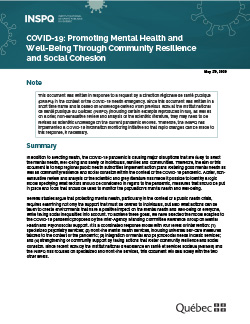COVID-19: Promoting Mental Health and Well-Being Through Community Resilience and Social Cohesion
In addition to affecting health, the COVID-19 pandemic is causing major disruptions that are likely to affect the mental health, well-being and safety of individuals, families and communities. Therefore, the aim of this document is to help regional public health authorities implement action plans fostering good mental health as well as community resilience and social cohesion within the context of the COVID-19 pandemic. A brief, non-exhaustive review and analysis of the scientific and grey literature has made it possible to identify a logic model specifying what factors should be considered in regard to the pandemic, measures that should be put in place and tools that should be used to monitor the population’s mental health and well-being.
Several studies argue that protecting mental health, particularly in the context of a public health crisis, requires examining not only the support that must be offered to individuals, but also what actions can be taken to create environments that have a positive impact on the mental health and well-being of everyone, while taking social inequalities into account. To achieve these goals, we have selected the model adapted to the COVID-19 pandemic proposed by the Inter-Agency Standing Committee Reference Group on Mental Health and Psychosocial Support. It is a coordinated response model with four levels of intervention: (1) specialized psychiatry services; (2) front-line mental health services, including universal self-care measures tailored to the context of the pandemic; (3) integration of mental and psychosocial needs in basic services; and (4) strengthening of community support by taking actions that foster community resilience and social cohesion. Since recent work by the Institut national d’excellence en santé et services sociaux (INESSS) and the INSPQ has focused on specialized and front-line services, this document will deal solely with the two other levels.
The following courses of action have been identified for those levels of the model:
- Promote accurate and positive information: Report daily on the latest developments and upcoming actions; inform people about the psychosocial consequences of a pandemic as well as available services, while reminding them that it is normal to have negative emotions; provide positive local examples of resilient individuals; reduce misinformation and disinformation about COVID-19.
- Encourage participation as well as citizen and community engagement: Encourage citizens to participate in the process of lifting lockdowns; involve communities with an accumulation of vulnerability factors in the search for non-stigmatizing solutions tailored to their situation; share and promote initiatives by citizens and community groups.
- Support social connections in cooperation with community resources: Work with local resources to set up an effective mutual aid network; support mutual aid projects among people while complying to physical distancing guidelines; provide local access to green spaces.
- Address the psychosocial needs of community members: Raise awareness among people involved in providing care and assistance in the context of COVID-19 about the essential principles of psychosocial care, such as psychological first aid; support bereaved individuals during their grieving process.
Lastly, a list of tools to support monitoring activities within the context of a public heath crisis like the current pandemic is proposed.
Note(s)
This document was written in response to a request by a Direction régionale de santé publique (DRSPu) in the context of the COVID-19 health emergency. Since this document was written in a short time frame and is based on knowledge derived from previous work at the Institut national de santé publique du Québec (INSPQ) (including certain excerpts reproduced in full), as well as on a brief, non-exhaustive review and analysis of the scientific literature, they may need to be revised as scientific knowledge on the current pandemic evolves. Therefore, the INSPQ has implemented a COVID-19 information monitoring initiative so that rapid changes can be made to this response, if necessary.


